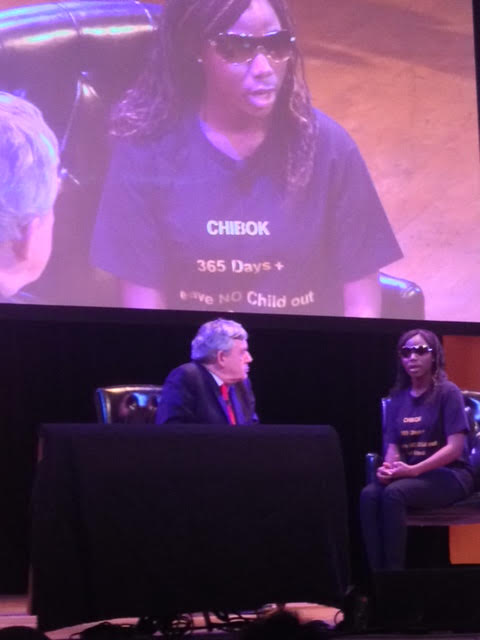America Did Not Bring Back Our Girls. An updates on world’s longest “Chibok” schoolgirl mass abductions that spawned the global #bbog
By Emmanuel Ogebe
Seven international aid workers were killed in Gaza this Easter Monday. The world acknowledged it immediately. The UN Security Council had passed a ceasefire resolution just a week before.
Yet, although Boko Haram terrorists bombed the UN building in Nigeria in 2011 killing 25, including UN diplomats, they were not sanctioned till May 2014 – weeks after infamously abducting almost 300 Chibok schoolgirls.
And now, as the world’s attention has turned to the latest flashtag, Gaza, as it desperately should and must, almost 10 years later, a new book credits the US with recovering 30 girls, which it didn’t.
This titillating nugget was found in the new book The Sisterhood: The Secret History of Women at the CIA by Liza Mundy:
“Her third posting was Nigeria, where in April 2014, 276 female students had been kidnapped from a Christian boarding school in Chibok by the Islamic terrorist group Boko Haram…Working with the British and French, they hoped to get all the girls in one fell swoop, but some had been married off to fighters and were reluctant or unable to leave their babies, at least not right away.
“But they did get thirty at one time, and others, in ones and twos, trickling, terrified, from the thick forest, clutching the offspring of the men they’d been given to” says the book about “Molly” a CIA operative.
“Women have worked at the Central Intelligence Agency (CIA) from its origins in World War Il through the present (and) books have been written about the U.S.’s main foreign spy agency, but not from the perspective of women,” Jo Freeman says in her review of The Sisterhood: The Secret History of Women at the CIA.
As heartwarming as this sounds, and I truly want it to be true, but there simply isn’t much support for the veracity of these claims.
Numbers and timelines don’t add up
As a top global authority on the world’s longest-running mass abduction, we know the initial 2014 escapes of 57 schoolgirls documented by the Christian Association of Nigeria (CAN) in Chibok in concert with ThisDay newspaper and ex-UK PM Gordon Brown; the miraculous escape of Amina Ali #127 in 2016 facilitated by her community’s youth volunteer as documented by my team and cited in the book The Chibok Girls: The Boko Haram Kidnappings and Islamist Militancy in Nigeria (Paperback), then there is the watershed work –
Beneath the Tamarind Tree:A Story of Courage, Family, and the Lost Schoolgirls of Boko Haram.By Isha Sesay ex-CNN anchor who witnessed firsthand the historic home return of the first batch of 21 girls ransomed in 2016 to Chibok fleetingly at Christmas.
But these numbers and timelines don’t add up with Molly’s CIA story. And it was a combination of the world’s elation at Amina Ali’s seismic resurrection from the depths and CNN’s Buhari regime-shaming world exclusive proof of life video that forced the freedom of 21 girls (Not 30) and not the CIA (thank you.)
And oh, at least 80 schoolgirls are still missing BTW, please, CIA. Maybe let’s revise that contemporary history first after we’ve actually brought back the girls after 10 years. Not before.
Nigerian government hiding information
From the archives, this epic account:
“Free from Boko Haram, Nigeria’s Chibok girls are kept silent” by Associated Press’ veteran MICHELLE FAUL
LAGOS, Nigeria (AP) — She was found wandering in a forest, the first of the nearly 300 Chibok schoolgirls kidnapped by Boko Haram to escape on her own and reach freedom. That was in May. Since then, Amina Ali Nkeki has been sequestered by Nigeria’s intelligence agency, embraced just once by her family months ago.
Some say Nigeria’s government is keeping the young woman silent because it doesn’t want her telling the world about military blunders in the fight against the Islamic extremist group, or about her desire to be reunited with the father of her child — a detained former Boko Haram commander.
“I worry, sometimes, that I don’t know if she is alive or dead,” her mother, Binta Ali Nkeki, sobbed during an exclusive telephone interview with The Associated Press from her remote northeastern village of Mbalala. She said she hasn’t seen her daughter since July.
Sunday marks 1,000 days since the Chibok schoolgirls were abducted together from a government boarding school in April 2014. Most of them remain in captivity. The few who have been freed, like Amina, have found themselves not completely free.
The mass kidnapping horrified the world and brought Boko Haram international attention. The failure of Nigeria’s former government to act quickly to free the girls sparked a global Bring Back Our Girls movement; even U.S. first lady Michelle Obama posted a photo with its logo on social media.
Amina was the first of the kidnapped girls to escape on her own. Months later, in October, the government negotiated the release of 21 Chibok girls. Another girl was freed in November in an army raid on an extremist camp in the Sambisa Forest.
On Thursday, one more was found during military interrogations of Boko Haram suspects, along with the baby she had given birth to in captivity.
Amina’s mother
When Amina’s mother heard last month that “freed” girls would be allowed to come home for Christmas, she borrowed money to reach Chibok, the town where their former boarding school is located.
She was welcomed by the 21 girls, who tried to reassure her that her daughter was “fine, in good health,” even though she had not been allowed to accompany them.
Human rights groups and lawyers have criticized Nigeria’s treatment of the freed girls, who are held in Abuja, the capital, nearly 900 kilometers (560 miles) from Chibok. The government says the girls are getting medical attention, trauma counseling and rehabilitation.
Officials in the government and the presidency did not respond to requests for comment, following a familiar pattern.
People who have spoken to the freed girls say they have stories the government does not want told, including that three Chibok girls were killed during Nigerian Air Force bombings of Boko Haram camps.
Amina, who is believed to be at least 20 though her uneducated mother says she has no idea, has insisted that her child’s father is a victim, like herself, who was kidnapped by Boko Haram and forced to fight for the insurgents.
Binta says that when her daughter was rescued — hunters found Amina, her 4-month-old baby girl and the father in a forest — she said she didn’t want to go back to school. But her mother and brother, Noah, persuaded her to take up Nigerian President Muhammadu Buhari’s promise to give her the best education possible.
“They told her that soon she will be starting school,” Noah Ali Nkeki told the AP in an interview. He got the news in a rare phone call from his sister on Thursday, the first time he had heard from her in three months.
He cannot call her. Officials call him using a blocked number and then put Amina on the line. The girl’s mother doesn’t get to speak to her because she doesn’t own a cellphone and reception in her village is poor.
“I don’t know what the government is trying to do. They have had her now for seven months,” Noah said.
Binta, a gaunt woman whose eyes mirror the pain of a hard life and whose hands are rough from farming, was widowed five years ago. Eleven of her children have died, in childbirth or soon afterward. Abina and Noah are all she has.
“I wonder how my only grandchild is doing,” she said of Amina’s daughter, Safia. “Do you think she’s walking by now?”
Binta was suicidal after her daughter’s kidnapping, community leaders have told the AP. There were reports Boko Haram threatened to sell the kidnapped girls into slavery, marry them off to fighters and force them to convert to Islam. Chibok is a Christian enclave in mainly Muslim northern Nigeria.
Binta rallied after she got a message from Amina in 2015. In Chibok, two male Boko Harem fighters accompanied by a teenage girl carrying ammunition came across an elderly woman too feeble to flee.
The girl, speaking the Chibok language that the fighters could not understand, told the woman, “I am Amina. My mother’s name is Binta in the village of Mbalala. Please tell her you saw me.”
The elderly woman described the encounter to community leaders, who worried that the “proof of life” message might be too much for Binta to bear.
Emmanuel Ogebe steps in
Human rights lawyer Emmanuel Ogede stepped in.
“If I had a daughter who was missing and she tried to send a message to me, l’d be very upset if someone withheld it. Amina tried to reach out, let’s help her complete the effort,” he counseled.
When Amina was freed, she and her family were flown to Abuja, where TV cameras and photographers documented Buhari welcoming her at the presidential mansion. That happened again with the 21 freed girls.
The girls needed trauma counseling and medical care, not exposure to the media, Human Rights Watch said at the time.
On Christmas Day, the freed girls visiting Chibok did not get to see their parents. They were kept in the house of a local legislator until Borno State Gov. Kashim Shettima arrived to “present” them to their parents the next day.
“Witnesses said the girls were angry that they were prevented from going home and to their church’s Christmas service.
Shettima’s spokesman, Isa Gusau, denied that account, which came from some of the parents.
“I am not sure they were denied access to their parents because that was the essence of them being taken to Chibok in the first place,” he told the AP. “If you say their movements were restricted for security reasons and for their safety, I think that makes sense.”
Yakubu Nkeki, chairman of the Chibok association of parents of the kidnapped girls and who is not related to Amina, said the Department of State Security (DSS) intelligence agents who accompanied the girls deemed it unsafe for them to visit parents in outlying villages. But those with homes in Chibok town were not allowed to stay with their families, either.
Amina’s mother, despite her tears, still has some faith in Nigeria’s actions.
“Anything that the government wants to do with Amina, I have no problem with that,” she said. “But I just want to see my daughter with my own eyes.”
On Friday, the Bring Back Our Girls movement criticized the failure to free the 196 girls still missing, saying it “is justifiably worried that the Nigerian government has once again relapsed to the same complacency, lethargy, and inertia that has been recurrent on this tragedy.”
Amnesty International also called for the government to “redouble its efforts,” warning the abductions could constitute war crimes.
__________________________________________________________________
Associated Press writers Haruna Umar in Maiduguri, Ibrahim Abdulaziz in Yola and Bashir Adigun in Abuja, Nigeria, contributed to this report.
Two final points here. At the time, 196 girls were still missing but over 100 of those are now back largely from the second batch ransom of 81 girls in 2017.
Lastly I was General Buhari’s Public Enemy Number One in Diaspora long before Nnamdi Kanu. I was targeted by multiple agencies of the Nigerian state including NIA, DIA and NSA all reporting to Buhari directly on me and I even sued his regime but the Bible says you must give the devil his due. The ransoming of 102 Chibok girls was done by his administration not by the USA.
If the USA wants to help, there are still 80-90 more Chibok girls unaccounted for.
___________________________________________________________________
Related articles:
Special fact-finding report on Leah Sharibu’s 6th abduction anniversary (Part 2)
Ogebe demands prosecution of Deborah Samuel’s murderers
___________________________________________________________________







